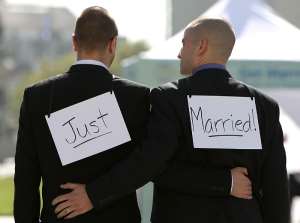
After months of speculation and uncertainty, the US Supreme Court announced January 16, this year, that it would hear cases on the contentious issue of same-sex marriage.
Subsequently, it has consolidated four cases dealing with this issue into one in which the parties are either contesting a state's refusal to recognize same-sex marriages legally performed in out-of-state jurisdictions or a state has refused to issue a license for same-sex marriage. The four cases that the Supreme Court has consolidated into one are cases from states that have banned same-sex marriage. These are Tanco v. Haslam (Tennessee), Bourke v. Beshear (Kentucky), DeBoer v. Snyder (Michigan) and Obergefell v. Hodges (Ohio). In reviewing these cases from state courts beginning April 28, the Supreme Court will be answering the two-fold question:
1) Does the Fourteenth Amendment of the US Constitution require a state to license a marriage between two people of the same sex?
2) Does the Fourteenth Amendment of the US Constitution require a state to recognize a marriage between two people of the same sex when their marriage was lawfully licensed and performed out-of-state?
The Supreme Court's decision to review these cases came after it had earlier declined to hear similar cases from five states even though it had earlier struck down the 1996 Federal Defense of Marriage Act (DOMA) as unconstitutional in United States v. Windsor.
To answer the first question, the Supreme Court will have to determine whether the Equal Protection clause requires a state to issue a marriage license. In my view, neither the wording of the Equal Protection clause nor the jurisprudence of the Supreme Court requires a state to issue a marriage license. In fact, nowhere does the US Constitution mention or define marriage. States have defined marriage and have issued a license or declined to issue a license according to their definition of marriage. If the Supreme Court determines that it is the right of states to define marriage to exclude or include same-sex marriages, then it is likely to answer the first question in the negative. The second question will, therefore, be moot.
However, if the Supreme Court interprets the Equal Protection clause as requiring states to offer equal protection to all persons in its jurisdiction and to provide the right to marry to all persons without regard to sex or sexual orientation, then it is likely to answer the first question in the affirmative. It is also likely to answer the second question in the affirmative with a proviso that a state's recognition of a marriage validly performed in an out-of-state jurisdiction must be subject to the state's law on reciprocity.
It seems more likely that the Supreme Court will hold that marriage is a state issue and that the Equal Protection clause does not require a state to issue a marriage license to same-sex couples or to recognize same-sex marriages performed in an out-of-state jurisdiction if the state that is to provide the reciprocity prohibits same-sex marriages.
Writer's e-mail: [email protected]




 Ejisu by-election: Aduomi warns NPP against voter intimidation
Ejisu by-election: Aduomi warns NPP against voter intimidation
 High Court orders implicated four NDA officials to present defence
High Court orders implicated four NDA officials to present defence
 Let’s all be matured, patriotic to have a peaceful election this year – Dampare ...
Let’s all be matured, patriotic to have a peaceful election this year – Dampare ...
 Mahama's administration saw thievery that knew no bounds; stole from market wome...
Mahama's administration saw thievery that knew no bounds; stole from market wome...
 GRA/SML deal: Always read the stories behind the headlines or you'd look stupid ...
GRA/SML deal: Always read the stories behind the headlines or you'd look stupid ...
 GRA/SML Contract: It takes some 'wild' boldness for a president to make this dec...
GRA/SML Contract: It takes some 'wild' boldness for a president to make this dec...
 Elisu By-election: "If you call yourself a man, boo Chairman Wontumi again" — Bo...
Elisu By-election: "If you call yourself a man, boo Chairman Wontumi again" — Bo...
 Fuel tanker driver escapes with his life after tanker goes up in flames near Suh...
Fuel tanker driver escapes with his life after tanker goes up in flames near Suh...
 Uniform change: ‘Blue and white are brighter colours’ — Kwasi Kwarteng explains ...
Uniform change: ‘Blue and white are brighter colours’ — Kwasi Kwarteng explains ...
 MoE not changing all public basic school uniforms but only newly built ones — Kw...
MoE not changing all public basic school uniforms but only newly built ones — Kw...
